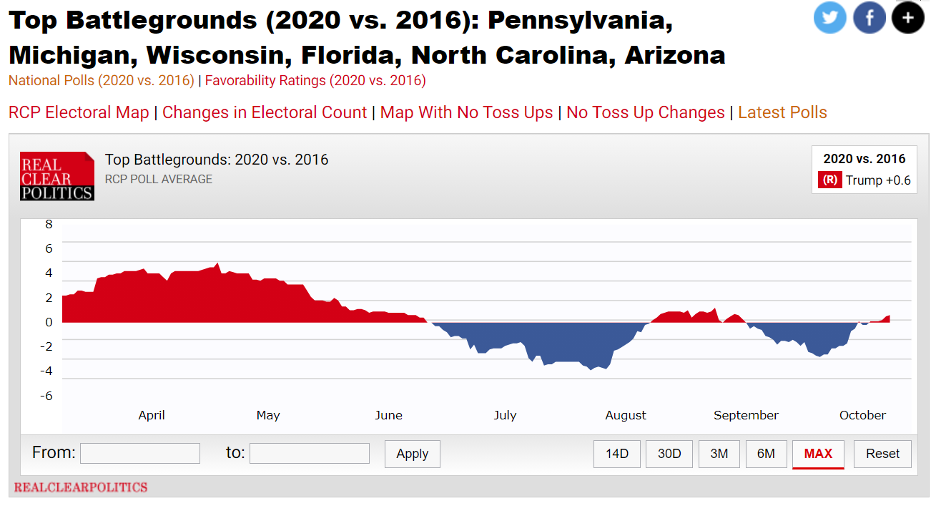Four years ago, nearly every professional pundit and pollster predicted a Hillary Clinton victory on election night, November 8, 2016. Statistician Nate Silver’s election model gave Clinton a 71% chance of winning. The New York Times’ The Upshot model said Clinton had an 85% chance of winning. The Princeton Election Consortium said Clinton had it in the bag with a 93% chance of victory.
But in the early hours of November 9, Donald J. Trump was declared the winner.
Here’s how it happened.
National Polls During the 2016 Race
The final Real Clear Politics (RCP) average nationally had Clinton leading by 3.2%. She ended up winning the popular vote by 2.1%. This means the national polls were off by 1.1% on average.
Yet, in the last month of the race, several polls predicted a double-digit win by Hillary Clinton.
The Atlantic’s poll showed Clinton up by 11% in October. Similarly, an NBC News/Wall Street Journal poll showed Clinton up by 14%. CBS News had Clinton up by 11% and Monmouth had her up 12 points. Just three weeks before the election, ABC News also showed Clinton up 12% while the Associated Press had her up by 13. A USA Today/Suffolk poll found Clinton ahead by 10%. CNBC likewise had Clinton up by 10.
And yet none of those massive margins became reality.
Now what about state polls?
State Polls During the 2016 Race
One of the reasons President Trump’s victory in 2016 was a surprise to many is that most polls, though somewhat accurate nationally, were off by wide margins in several key battleground states.
In Wisconsin, the RCP average had Clinton ahead by 6.5% on election night. Though precisely zero polls had Trump leading in the state during the entire year, Trump won Wisconsin by 0.7%. The polls were off by 7.2% on average.
In Michigan, the final RCP average had Clinton winning by 3.6%. Trump ended up on top by 0.3%. That equates to a 3.9% average polling error.
The Trafalgar Group was the only polling company to accurately predict Trump’s unexpected victories in Michigan and Pennsylvania, and it was included in the final RCP average. It showed Trump leading in Michigan by 2%. Excluding the Trafalgar Group, the final four polls of Michigan showed Clinton up by 5%, increasing the average error margin to 5.3%.
Additionally, during the month of October, in the last month before the election, several polls had Clinton up in Michigan by double digits. Detroit News said Clinton was ahead by 14%. Fox 2 Detroit/Mitchell had her up by 10% and 12% in two separate polls.
In Pennsylvania, the final RCP average predicted that Clinton would win the state by 2.1%. Trump ended up victorious by 0.7% which equates to a 2.8% polling error.
Again, the Trafalgar Group correctly predicted Trump’s win with its final poll showing him up by 1%. Excluding the Trafalgar Group, which was included in the final Pennsylvania RCP average, the last polls of the state predicted Clinton would win by 2.8%, increasing the polling error to 3.5%.
Several Pennsylvania polls also showed Clinton up by double digits in the final month of the election. Monmouth had Clinton up 10%. Franklin & Marshall showed her up by 12 points. And an NBC/WSJ/Marist poll also showed Clinton up by 12.
The polls showed a close race in Ohio and Iowa during the final days, but Trump won by surprisingly large margins.
The final RCP average had Trump up by 2.2% in Ohio. He won the state by 8.1 points which equals a 5.9% average polling error. And the RCP average in Iowa had Trump up by 3% though he won the state by 9.5 points which equaled a 6.5% polling error.
2016 Race Compared to Today
With all that said, where is the state of the race now in 2020 compared to the same point in 2016? That is, if you believe polls in the first place.
According to the RCP average of national polls, Joe Biden currently leads President Trump by 9.6%. At this point in 2016, Clinton was leading by an average of 5.3% which means that Trump is currently running behind where he was at this same time in 2016 by 4.3% nationally.
However, according to the RCP average of the top battleground states, Biden is currently leading Trump by 4.5%. At this point in 2016, Clinton was leading Trump by 5.1% which means President Trump is currently running 0.6% ahead of where he was at this point in 2016 in the states that will ultimately determine in the outcome of the election.

Photo Credit: Real Clear Politics
Additionally, the Trafalgar Group, which RCP described as “one of the most accurate polling operations in America,” has found close races in nearly all of the battleground states.
The group has Trump up by 4.0% in Arizona and Ohio, 3.0% in Florida, 2.0% in North Carolina and 1% in Michigan.
The Trafalgar Group also shows Biden up by 2.0% in Pennsylvania and 3.0% in Wisconsin.
Ultimately, this election is likely to be close. The poll that actually matters is the ballots cast on election day.
And there’s still 25 days to go. As one person said, “It used to be that a week was a long time in politics … now a single day is akin to eternity.”
To make sure you are registered to vote on or before election day, November 3, 2020, or to find out more about the candidates, visit The Daily Citizen’s Election 2020 page by clicking here.
You can follow this author on Twitter @MettlerZachary
Photo from Shutterstock
Visit our Election 2020 page
The post Are the Polls Wrong Again? Compared to 2016, Trump is Behind Nationally but Ahead in Battleground States appeared first on Daily Citizen.
Read More
Daily Citizen
